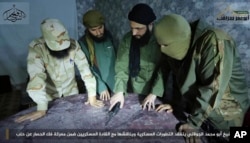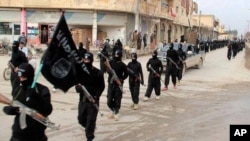Al-Qaida leader Ayman al-Zawahiri is urging followers around the world to unify against what he calls the "international satanic alliance."
In a 28-minute undated audio-video message that surfaced Wednesday, al-Zawahiri said, "We are facing the fiercest attack in the history of Muslims. The Crusaders, atheist Russia, China, Rawafidh [rejectionists], secularists and the treacherous rulers have all joined hands against us."
VOA could not independently verify the authenticity of the message.
Al-Zawahiri took charge of the al-Qaida terror organization after his predecessor, Osama bin Laden, was killed in a U.S. Navy SEAL raid in 2011 in Pakistan's Abbottabad. His precise whereabouts are unknown, but security analysts think he most likely is hiding in the Afghan-Pakistan border region.
The message, released less than a month after the 16th anniversary of the Sept. 11, 2001, terrorist attacks on the U.S., came as the terror organization is facing a series of defeats around the world, particularly in Syria, where its offshoot groups are being squeezed by the Russian-backed Syria government.
The Russian Defense Ministry on Wednesday claimed its airstrikes in Idlib province in northern Syria had critically injured Abu Mohammed al-Golani, the leader of the al-Qaida-linked Tahrir al-Sham group, and killed 12 of his field commanders.
Bitter competition
Once a leading terror group, al-Qaida has engaged in acrimonious and at times bloody competition with other Islamist groups over the years. The rivalry between the group and the Islamic State in Syria has resulted in the deaths of thousands of fighters from both sides.
"There is no way out for us except uniting our ranks to confront this aggression," al-Zawahiri said in the message. "Let us mobilize our efforts, divide our roles, distribute our responsibilities and together diffuse the efforts of the enemy."
Al-Zawahiri blamed the fighting among violent Islamist groups on "the principle goals of America" and its allied countries in the Islamic world. He claimed the U.S. has worked to splinter a united global jihadist movement into regional jihadi groups in discord with each other.
"This fragmentation, severing of bonds with one another, this distance and division among ourselves, is only the prelude to defeat, if not defeat itself," he said.
Last month, Hamza bin Laden, a son of Osama bin Laden, believed to be in his late 20s, also released a video asking for unity among jihadi militants around the world and calling for a new effort to save Syria from the Bashar al-Assad regime.
"Extreme vigilance and urgent, organized, serious action is needed to support the people of Sham before it's too late," he said in an audio recording. Sham is the region that includes the modern-day countries of Syria, Lebanon and Jordan.
Al-Qaida weakening
Experts said the recent desperate call by al-Zawahiri for unity, less than a month after Hamza bin Laden's message, reflected al-Qaida's diminishing ability to recruit more fighters. They said the group was concerned that the failure of jihadist groups to retain their territories could dissuade militants from joining these groups.
"He is concerned, given the collapse of the [Islamic State] caliphate," Colin P. Clarke, a political scientist at the RAND Corporation, a global policy research group, told VOA. "He is worried that some jihadists might leave jihad altogether."
Clarke warned that al-Qaida would most likely take an opportunistic approach to filling the vacuum created by the defeat of the Islamic State group and draw IS members into its ranks, especially in Syria, because of the ongoing conflict in the country and its strategic location.
"Syria is a better place to use as a logistical staging ground for attacks against the West, and much more so than Yemen, due to geography and proximity to Turkey, which is a land bridge to Europe," he said.
Experts like Daveed Gartenstien-Ross of the Washington-based Foundation for Defense of Democracies argue that despite being significantly degraded through U.S. and international efforts, al-Qaida is unlikely to be completely defeated in the near future, because over the years, the group has demonstrated its ability to adapt to pressure.
"Al-Qaida seems to have more lives than a cat. ... It has skillfully played itself off [IS] to portray the organization as being the 'moderate jihadists,' people whom you might not like but you can do business with," Gartenstein-Ross said while speaking at the launch of a report on the current jihadist threat published by the Washington-based New America Foundation.







